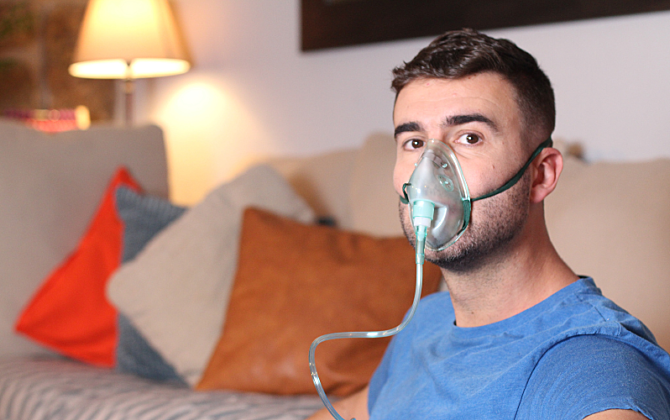Jump to
About the trial
Acute intermittent hypoxia (AIH) is a non-invasive intervention that has shown the potential to improve breathing and movement after a spinal cord injury. A typical AIH session involves breathing brief periods of low oxygen air alternating with brief periods of normal room air. Recent human studies have shown us that we need to work on optimising the dose to maximise the results.
This study aims to understand how low oxygen and high carbon dioxide gas mixtures may affect neural connections between the brain and muscles to perform motor tasks in people with spinal cord injury.
What is involved in participation?
The study involves two 3‑hour study sessions at NeuRA where volunteer participants are asked to make maximal contractions of the thumb before and after breathing in gas mixtures using a mask with either low oxygen and high carbon dioxide and/or normal oxygen levels. This study involves electrical nerve stimulation and magnetic brain stimulation.
You will be reimbursed of your travel expenses up to $100 each way as well as $20 per hour of your time spent at NeuRA completing the procedures of the study. You will be reimbursed immediately after each testing session.
Below are the inclusion criteria for this study:
- Are 18 – 65 years old
- Have chronic cervical spinal cord injury (>1 year, American Spinal Injury Association Impairment Scale (AIS) A‑D)
- Able to make weak contractions of the hand and/or upper arm
- Are able to breathe independently (without ventilator assistance)
- Have a lung capacity of >1 L and resting oxygen saturation of >96%
Individuals may not be eligible if they:
- Are prone to increased blood pressure due to external stimuli that cannot be modulated (i.e. autonomic dysreflexia), or had autonomic dysreflexia in the last 6 months
- Are pregnant or think you might be pregnant
- Have a history of epilepsy
- Have any metal implants in your head or any electronic implants in your head or body
- Have any other brain or nervous system disorder or surgery or any malignancy (cancer)
- Have been diagnosed with moderate or severe lung disorder
- Have been diagnosed with heart failure or serious cardiovascular disease
- Have had any recent change in medications
- Cannot give informed consent
To find out more about the AIH study
Download our information sheet here- Email Chiettha Prajnadewie at email hidden; JavaScript is required.
- Or sign up to our Research Participant Database to be contacted about relevant research at SCIRC.








